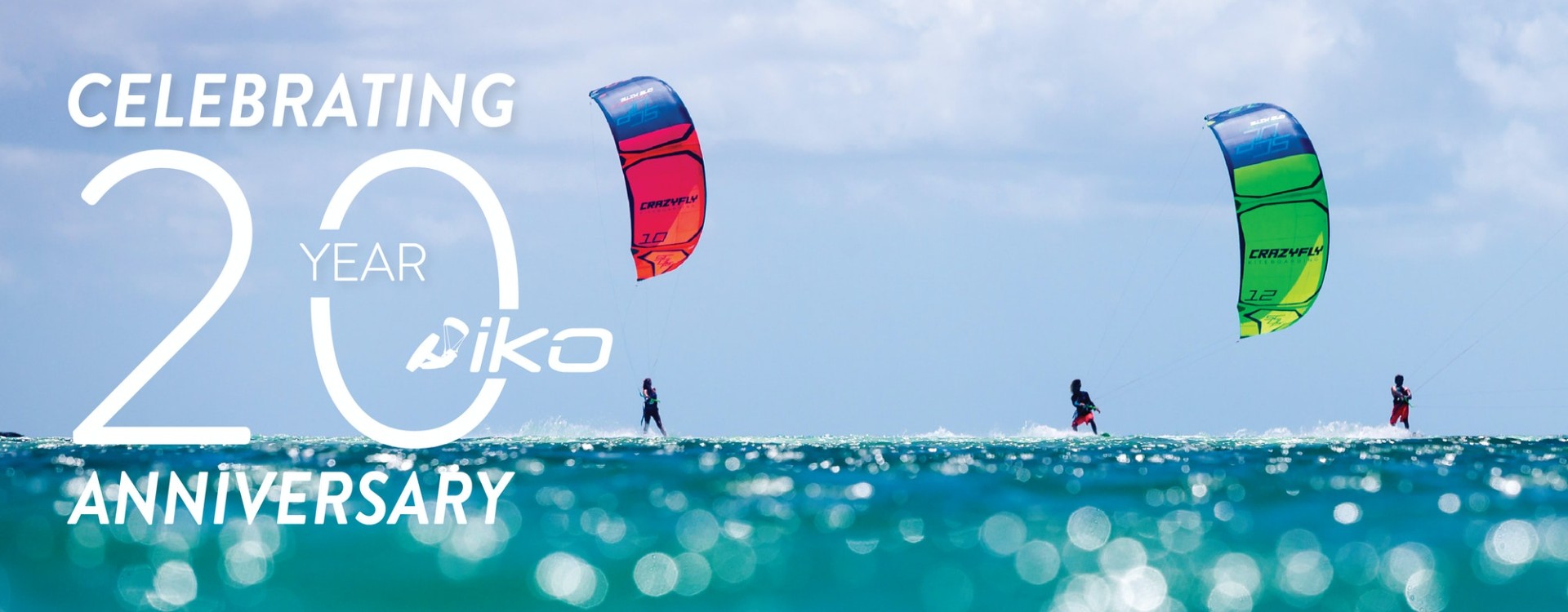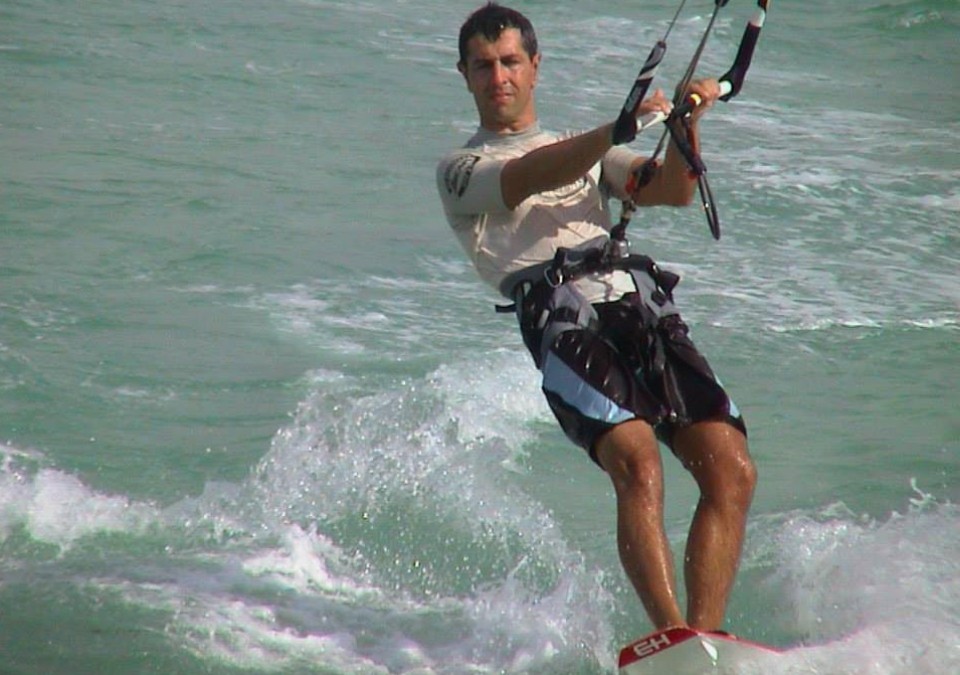This month marks the 20th anniversary of the founding of the the International Kiteboarding Organization (IKO). The IKO was founded in 2001 by Frédéric Bené and Eric Beaudonnat and became the leading kiteboarding organization, specialized in kiteboarding education, promoting safe practices and enhancing the highest standards for the industry over the last 20 years. The IKO is in constant development but the goal remains the same - the safe and sustainable growth of kitesurfing. IKO co-founder Frédéric Bené looks back in this interview at the organization’s origins and explains his vision for the future.
Photo: IKO Co-Founder Frédéric Bené, Las Terrenas, Dominican Republic, 2003
Why did you and Eric Beaudonnat start the IKO?
We started the first training courses for distributors, shops and schools in 1999 in the Dominican Republic with WIPIKA, the first brand of inflatable kites. The feedback we received from people who took the courses was so encouraging that in 2000, schools working with other brands from around the world asked us to run some training courses to train their school team.
At that time, the market was booming and safety was important to sustain the growth of the sport. We also envisioned the future of the sport where kiters and instructors would travel, learn and teach anywhere. So we came up with the ambitious idea to support the kite community worldwide with a progressive training program independent from any brand and for all levels. The name International Kiteboarding Organization IKO was created in 2001.
We were super motivated as we had the unique opportunity to contribute to the development of this new fantastic sport. At the same time, we were excited about founding a global network where students, kiters, instructors and schools would all benefit.
It’s motivating to work for an organization in a sport that you’re passionate about and at the same time make a positive impact on people's lives.
Those early years were so exciting. We started to learn with a 2-line kite and a board that wouldn’t let you go upwind, only downwind, but the sensation of riding on the water with just a little bar in your hands was an adrenaline rush.
Then brands quickly started to develop products that performed better and were safer and the release of the 100% depowered kite in 2004 opened even further the sport to more people.
The kite evolved from 2-line to 4-line, from low to high aspect ratio, different shapes and sizes.
You could see every style of riding - some kiters were using wakeboards with 2-line kites to push harder at the beginning. With the 4-line arrival, the era of new extreme aerial and technical tricks started. What a surprise when the young Argentine rider Martin Vari did a handlepass at the Cabarete world tour event, the crowd was delirious.
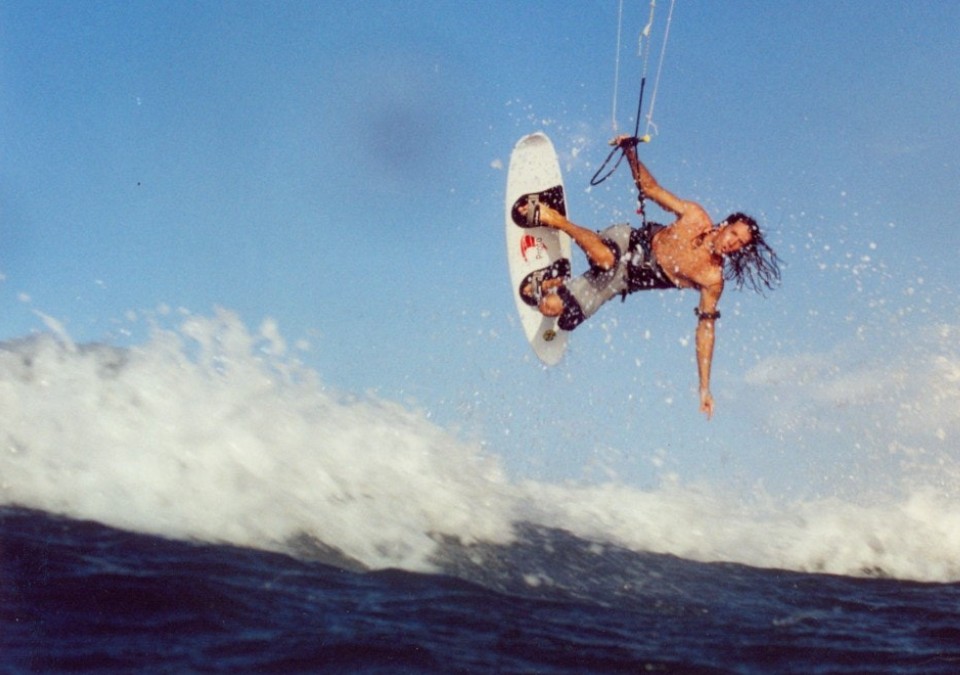
Photo: IKO Co-Founder Eric Beaudonnat, Cabarete, Dominican Republic, 2000
What challenges did the IKO face over the years?
Gaining recognition from the community
We quickly realized that to achieve our objective we would have to develop a strong, quality international program that would greatly help at the same time students, instructors and schools so we could gradually gain recognition from the international kite community.
There were already some national organizations or federations providing kitesurf training in the US, UK, Germany, Australia, Italy and France.
Our first intention was to work with these organizations within international standards but we quickly realized we could work directly with schools on any continent. We collected feedback from each of our members tirelessly to build the best teaching and learning tools and we updated the training content regularly. We gained awareness of our members gradually as our program was getting more and more solid year after year. It was a nice reward for our hard work.
Satisfying the pro training demand
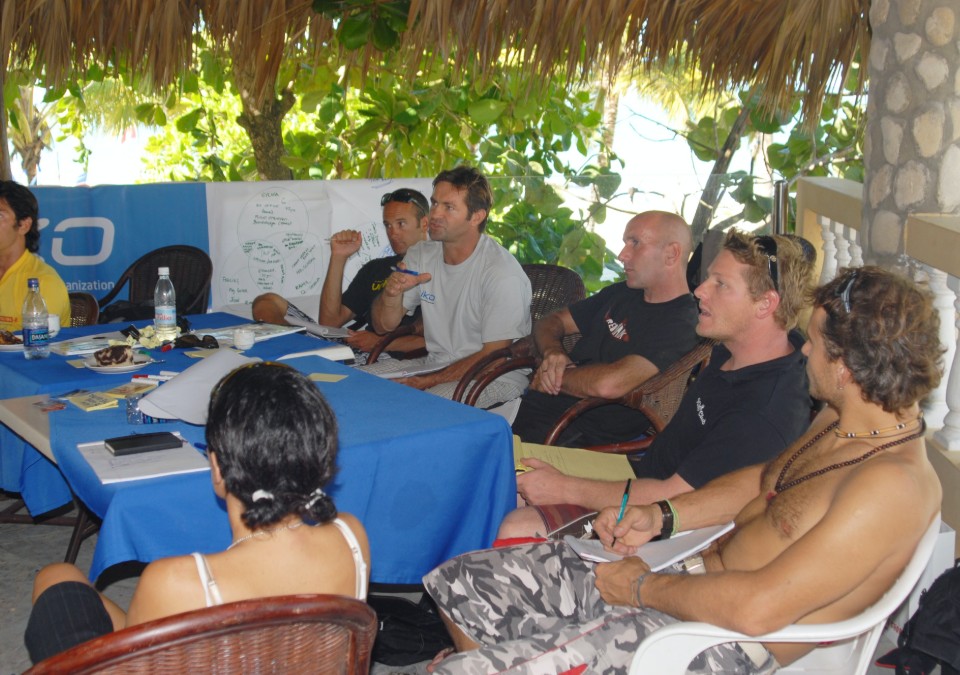
Photo: IKO Examiner meeting, Cabarete, Dominican Republic, 2008
The demand accelerated quickly. During the early years, Eric was travelling the world and meeting new people from different countries, but one Examiner was not enough to run all the instructor trainings worldwide. Therefore, we launched the Examiner program and started to train a few Examiners selected from the top certified instructors. From there, we could run courses simultaneously in different parts of the world. The Examiner job contributed to the success of the IKO.
Maintain standards and quality
Growing quickly is a challenge itself. To control quality, we set up a dedicated office team, created tools for trainers and members to help them follow safety standards, and established clear rules with sanctions. Since the beginning, we’ve strictly enforced sanctions and this has helped keep kiters and instructors safe.
What is the mission of the IKO and what has the IKO done to accomplish that mission?
Today, a large number of kiters become independent and look to improve their skills and also to experience adventures at new spots and destinations. As we want to continue to satisfy kiters whatever their level and the experience they look for, last year, we redefined and broadened our mission and now IKO is “Empowering the world to experience kiteboarding with confidence.”
In the earlier years, safety was our top priority because the risks of accidents were high. Many spots had few or no qualified instructors to teach appropriately and the kites were not 100% depowered. Safety is still the most important aspect and is the DNA of all of our trainings. However, we have trained today over 16,000 instructors worldwide, and over 350 affiliated IKO Centers follow our standards. This means you can learn with IKO and get confidence in almost any kite spot in the world.
Over the years, for the independent kiters who look to progress safely, our training program has been extended with the coach program available in all disciplines including the most recent ones - hydrofoil to wingfoil.
To realize our mission of spreading safety with knowledge for all, our training courses have been translated in 5 languages and an eLearning section is available in our App.
The IKO is now the largest kitesurfing organization in the world. How did it get to this point?
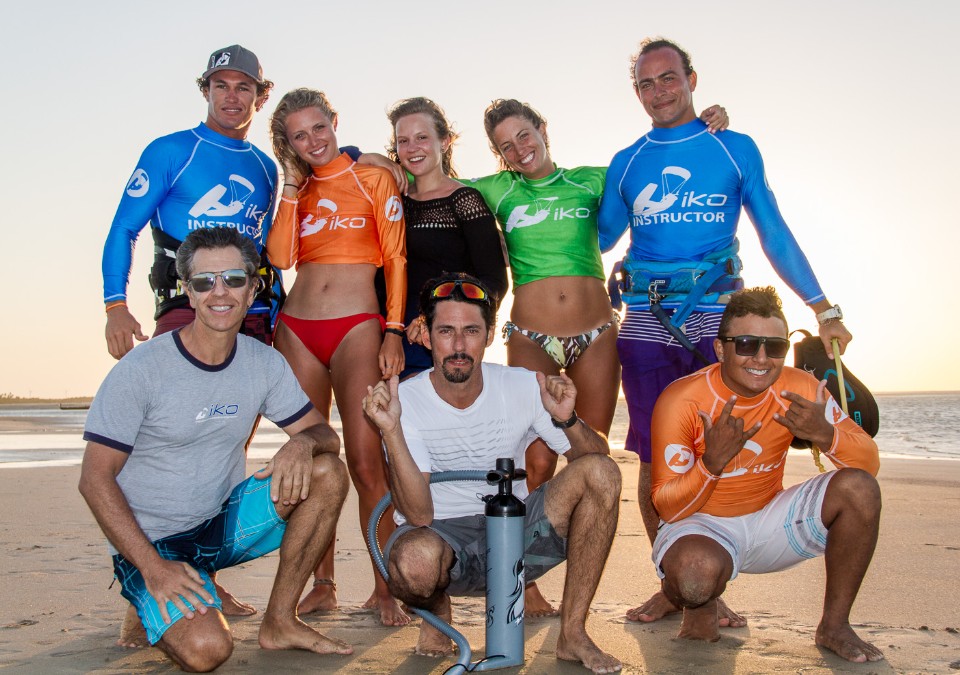
Photo: IKO Co-Founder Frédéric Bené with IKO Instructors, ilha do Guajiru, Brazil, 2016
This dream came true and I’m so proud of the IKO instructors, trainers and schools that contributed to certifying over 600,000 students so far. Behind the organization, there are dedicated professionals who run lessons, teach and share their passion daily so new people get involved in kitesurfing. By providing the right training, tools and services to the pros, we create together this synergy that built the largest kitesurfing organization.
Our successful recipe is that we stayed connected with the community, we listened to them from the beginning, we help them to evolve and reach a higher level of certification.
The IKO progressive training path is international and the most comprehensive training for kitesurfing. It’s logical that it would attract the largest numbers of kiters.
What’s next for the IKO and for the sport?
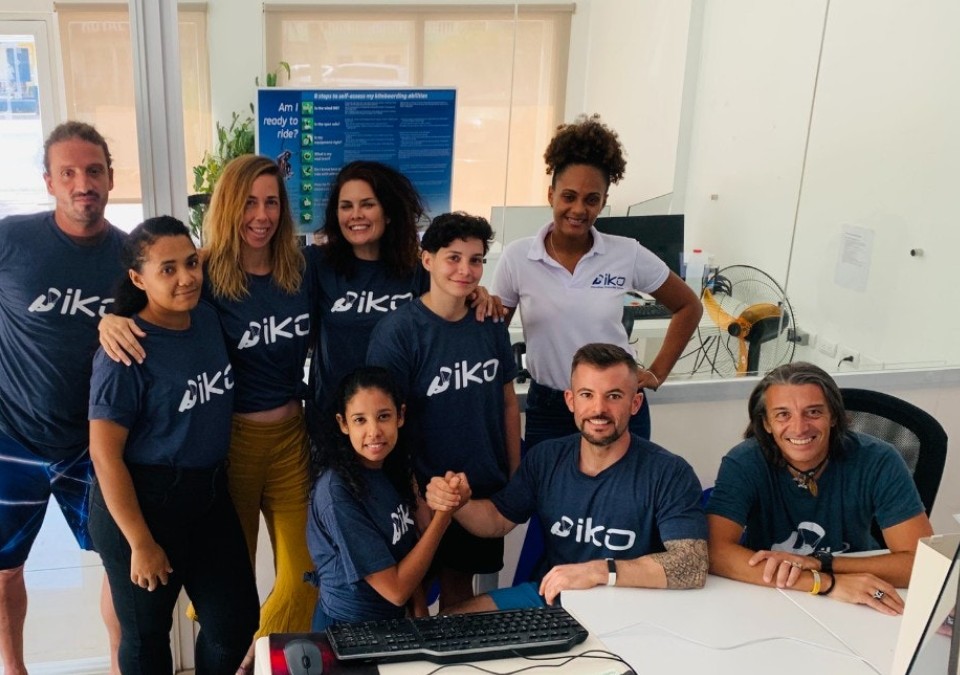
Photo: The IKO office team, Cabarete, Dominican Republic, 2021
The future is promising. The sport still evolves with the new disciplines like hydrofoil and wingfoil and the independent kiters explore more and more new disciplines and destinations. IKO aims to support this evolution in all aspects.
For the beginner, we are preparing a complete online course so they can save time and boost their progress like never before during his practical course with his qualified instructor. The course will be divided into three interactive videos corresponding to the first beginner levels. The student will watch and learn step-by-step all they need to know with a virtual instructor who explains the techniques and does the demo. A smart way to learn quickly, anywhere and anytime.
Hydrofoil and wingfoil disciplines have become popular and we released some of the first online content and more is coming. We also updated the coach program so that kiters can book a lesson in these disciplines with a certified IKO Coach. All IKO instructors can become IKO Coach Level 1 and teach any Evolution Course discipline - freeride, freestyle, wave riding, hydrofoil and wingfoil. In 2022, these Evolution Courses will be offered by more certified Coaches in different spots.
Kiters are also enjoying new destinations and experiences whatever the discipline.
For independent kiters who are eager to participate in downwinders, kite trips or boat trips, we are setting up IKO Adventures where qualified coaches will run trips recognized by IKO.
Our desire is to enrich the kite experience by offering all types of kite packages worldwide so that kiters of any level can book with a qualified IKO Coach or Instructor.
And to enhance their journey, kite spot and destination information at a glance are being added to the App.
